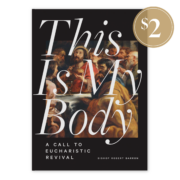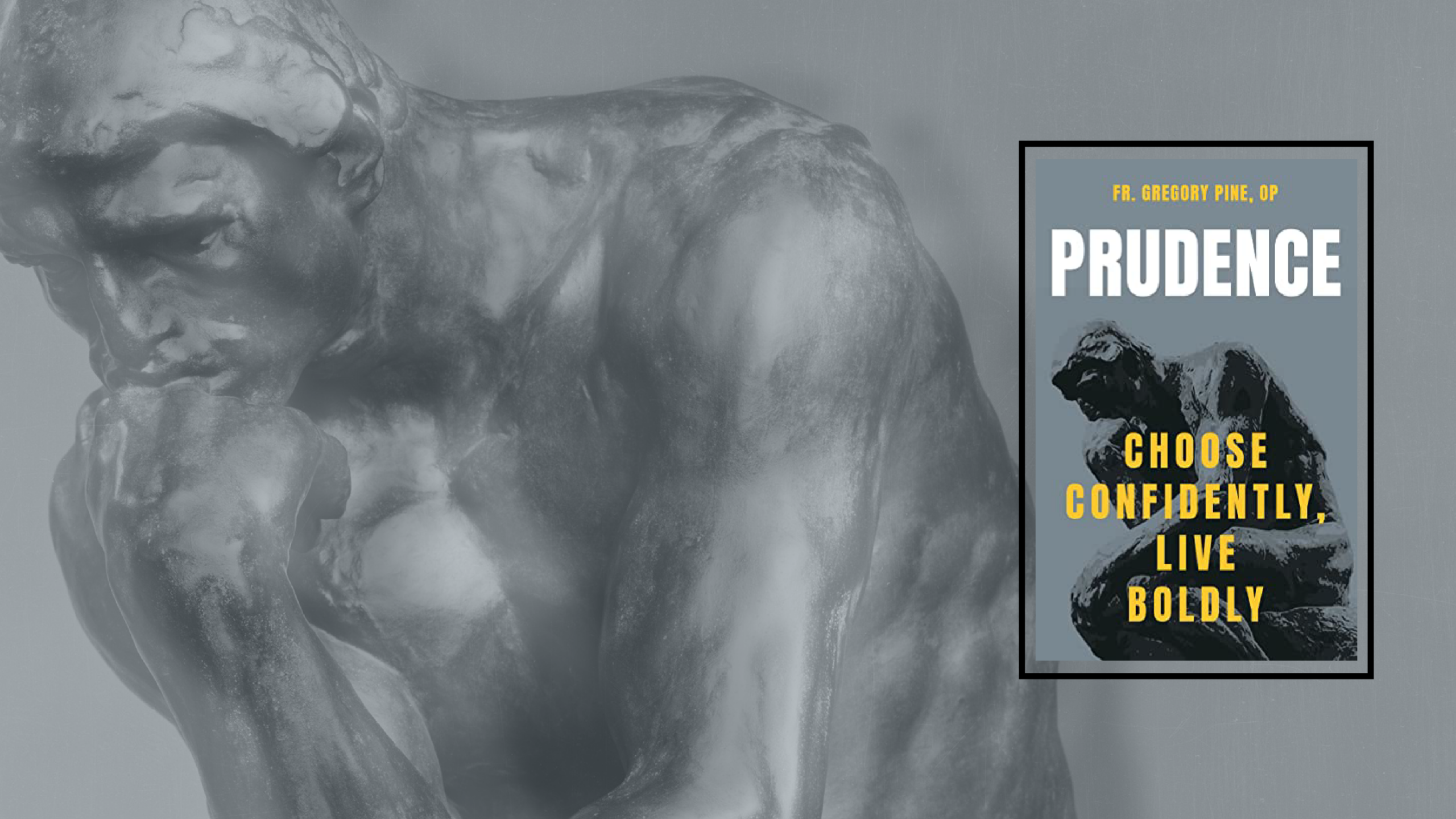This week, Matt Nelson sits down with Fr. Gregory Pine, O.P., to discuss his new book Prudence: Choose Confidently, Live Boldly (OSV, 2022).
Fr. Gregory Pine, OP, is a Dominican friar of the Province of Saint Joseph. He is coauthor of Credo: An RCIA Program and Marian Consecration with Aquinas. He contributes to the podcasts Godsplaining and Pints with Aquinas. Currently, he is assigned as a doctoral student in dogmatic theology at the University of Fribourg, Switzerland.
1) First off, why did you write this book? What was it that pushed “prudence” to the top of your list of things to write a book about?
The simple answer is that the editor asked me to write the book. I am not an especially ambitious person, so I typically only end up doing the things that other people envision for me. Turns out, saying “Yes” opens up weird doors. Prudence, really? Not something like vocation or the Eucharist? That being said, I had been getting interested in prudence for a while. When I started studying the virtues as St. Thomas Aquinas explains them, I was generally blown away, but when it came to his teaching on prudence, I was especially blown away. Prudence sounded, at first, like a total kill-joy to me, the proverbial wet blanket of unimaginative and otherwise lame Christianity. Instead, I discovered a dynamic wellspring of human happiness and flourishing. So I began reading about it at a moderate pace and speaking about it at a rapid pace, which is my tendency with most things.

2) How is prudence connected with happiness? Are the most prudent people among us the most happy?
In short, prudence is the virtue that empowers one to be the protagonist of his or her life and to chart a course toward happiness. Many people feel like life is just happening to them. Whether they do well or poorly and find themselves happy or unhappy appears as a mere matter of luck or chance. Now, if life were about producing optimal or maximal results, then there would be some truth to this assessment. But, well, life isn’t about producing optimal or maximal results. The goal of life is happiness: the glory of God and the salvation of souls. This goal is achieved by living a life in accord with virtue, by becoming the type of person who cannot be otherwise than good because he has lived his life toward that end.
For us, the drama of human growth is that we can come to be real moral virtuosos who are able to improvise and extemporize as occasion arises. For the moral virtuoso, each discrete decision isn’t so much an occasion of agony and anguish as it is an opportunity among many to grow in and set to work the habits of mind and heart whereby to know, and love, with genuine liberty and, dare I say, flair. Prudence provides one of the key components in that moral transformation. For prudence infuses reason into our actions. It is the virtue of practical wisdom, the virtue of effortless know-how.
3) Would it be accurate to say we live in a prudence-deprived society? What have been some real-world consequences of that?
I think we do, but not for the reasons that some might think. A lot of times you hear prudence described as if it were just caution or circumspection. People appeal to prudence when they don’t want to embroil themselves or when they judge a financial investment to be too risky. Prudence is the word that people say as they back away from involvement. But while caution and circumspection are certainly parts of prudence, they are not the whole of it. Our society is good at living this caricature of prudence, but it needs to be challenged to live the fullness of prudence. Prudence isn’t about washing your hands of human activity and choice. It is about committing to human activity and choice. The prudent person is in touch with the reasons for action, he judges them well in light of setting and circumstances, and then he acts for the good. All along the way, he seeks to grow in his exercise of knowledge and love with the conviction that his real life is present before him, and that he will draw rich experiences from that life provided he is willing to commit to it. Modern humanity is haunted by the fear that our real lives are elsewhere, to be discovered by going over, under, or around our present condition. We need prudence to be convinced of the urgent worth of the opportunity at hand.
4) Can prudence be practiced in isolation from the other virtues?
No, it cannot. Prudence is often referred to as the charioteer of the virtues. But a charioteer without horses is just a man in a cart. Prudence draws on the energy of what we call the moral virtues—justice, fortitude, and temperance. These moral virtues heal and elevate our appetites—our desires for food, drink, sexual intercourse, family life, human society, the worship of God, etc. The appetites spur us on towards these different goods, but they rely upon prudence to orient their striving and to coordinate their desiring. Without the moral virtues, prudence is powerless, but without prudence, the moral virtues are blind. Prudence is like a battlefield general who knows the competencies of all of his different detachments. He knows infantry, cavalry, armor, artillery, etc. As such, he is able to orient them towards the prosecution of the war while he coordinates their movement in mission success. Prudence could also be described as the concierge of a hotel. She knows all the desires of all of the guests, and she is able to satisfy each in its way on account of the fact that, by her vast experience, she knows who they are and what they need, perhaps even better than they do.

5) What are some practical things we can do to “practice” prudence so that we can really develop it in ourselves as a deep-seated virtue?
First off, all the virtues grow together. So growing in prudence shares a lot with growing in any virtue. We should seek to pray, make good use of the sacraments, introduce some penance into our lives, cultivate good Christian friendships, study the faith, serve the materially poor, etc. Specific to prudence, though, there are a couple of practices that can be particularly helpful. Prudence is about making decisions well. So if you’re indecisive, you can challenge yourself to be more efficient and resolute in your decisions. Set a deadline, make the purchase, don’t revisit it (or even look at the return policy). If you’re overly hasty, you can challenge yourself to take counsel with one or two friends before making the types of choices where you often get yourself into trouble. You might also keep a prudence journal, where you describe your decision-making process and then revisit your decision after a week, a month, and a year to see how they have contributed to your growth in virtue and happiness.
You might also consider reading more literature. Literature can be a good way of inhabiting an alien moral world. It can have a profoundly humanizing effect as you inhabit the prudence of another and suffer all the difficulties of decision that the characters experience.
